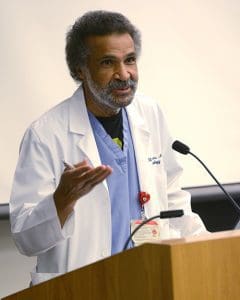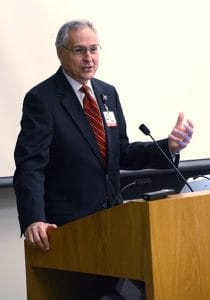Doctor Explores Roots of Racism as UAMS Honors King
| Jan. 28, 2016 | “Are we born racist?”
That was the tough question posed by Erick Messias, M.D., Ph.D., M.P.H., as UAMS employees and students gathered Jan. 24 to celebrate Martin Luther King Jr.’s dream of equality and to discuss where we stand in achieving his goal.

Billy Thomas, M.D., vice chancellor for diversity and inclusion, stressed the importance of action as we examine growing social unrest in our country.
Approximately 150 people attended an hourlong program celebrating Dr. King’s legacy. The “Through the Looking Glass: The Despair. The Dream. The Destiny. (Part 2)” program was sponsored by the Chancellor’s Diversity Committee, which is part of the UAMS Center for Diversity Affairs.
Billy Thomas, M.D., vice chancellor for diversity and inclusion, said the growing social unrest at universities across the country illustrates how much work is left to do to realize King’s dream.
“People feel isolated. They feel like they’re not being recognized based on gender, race or ethnic background,” he said. “For me, I think it is an optimum time for us as an academic health center to really look at how to change those types of issues.”
Kicking off the commemoration was a video that featured employees and students sharing what questions they would ask King if he were still alive. The video was narrated by diversity committee member Amber Booth and produced by McNificent Productions.
Wanda Nelson, an education development specialist, said she would ask King “where do we go from here?”
For graduate student Quinton Jones, the question on his mind is, “How close are we to achieving his dream? I know that progress is being made, and we still have a long way to go, but I wonder, in his eyes, how close are we?”
King’s own words provided the ruler by which the day’s speakers measured society’s progress in achieving equality.
“One day the South will know that when these disinherited children of God sat down at lunch counters, they were in reality standing up for what’s best in the American dream and for the most sacred values in our Judeo-Christian heritage, thereby bringing our nation back to those great wells of democracy, which were dug deep by the founding fathers in their formulations of the Constitution and the Declaration of Independence.”
Martin Luther King Jr. in his “Letter from a Birmingham Jail”
Chancellor Dan Rahn, M.D., said King’s words in his letter are an eloquent statement of the importance of doing what we know is right, regardless of the personal costs.
“So often we find in our professional lives, when we believe we have an ethical dilemma, we don’t,” he said. “We know what the right thing is to do. The issue is having the will to do the right thing.”
Messias, who left UAMS last year to become medical director for Beacon Health Options, recited perhaps King’s most famous quote.
“I have a dream that my four little children will one day live in a nation where they will not be judged by the color of their skin but by the content of their character.”
Martin Luther King Jr.

Chancellor Dan Rahn, M.D., urged the crowd to have the will to do the right thing, even if the personal costs of doing so are high.
Messias, former medical director of the Walker Family Clinic at UAMS’ Psychiatric Research Institute, called King’s dream “the greatest dream we have together,” and asked “can we can make our nightmares of prejudice and segregation into a dream?”
We can, but only if we acknowledge that our brains are being programmed from birth to make split second decisions about the worth of a person based on external factors, including race and socioeconomic status, he said.
“I think prejudice goes beyond race. In fact, prejudice has to do with stereotypes,” Messias said. “Prejudice has to do with what your brain has been trained to think when it sees something. We are all products of our environment.”
But that is no excuse for discrimination and inequality, he said.
“We need to open our eyes. We are at the edge of an abyss of segregation, of separation, of hate for one another,” Messias said as he ended his presentation. “I think if we open our eyes, we can walk away from the abyss of prejudice and we can walk to the mountaintop. And then Dr. King will be waiting for us there.”
“I say, we may be born racist, but we shouldn’t die one.”
